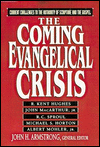|
The Coming Evangelical Crisis by John H. Armstrong (editor) Reviewed by Tim Chaffey |
This book took me several months to finish although it was well worth the wait. John H. Armstrong gathered essays from leading scholars, preachers, and teachers of our nation to compose this book. Among those contributors were men like R.C. Sproul, John MacArthur, R. Kent Hughes, S. Lewis Johnson, and many more.
The purpose of this book was to address some of the many problems that the church is currently facing. The authors conclude that the root cause of most of these problems is a result of decades of diminishing the importance of Godís Word by the very people who claim to uphold it.
The first part of the book discusses what the problems are in the church today. The final chapter in this section asks the question that all Christians should answer in the affirmative: Does theology still matter?
The second section addresses the nature of Godís Word. How is it that we know about God and His plan for our lives? Is our knowledge of God based on feelings and emotions or does our knowledge of Him come from His Word.
The third section examines some of the compromises that have taken place in the church in recent years. The church is being destroyed from within. People who claim to be Christians do not know Godís Word and often do not even believe Godís Word.
This section also looks at the evangelical churchís desire to be ďlikedĒ by the world. John Hannah demonstrates that the church has followed after manís opinions and tried to please man rather than God.
The fourth section examines some of the serious problems that have arisen because of the compromise that has taken place. John MacArthur examines the subject of worship and illustrates how far off the mark so many churches have gone. David Powlison examines the modern churchís reliance upon psychology rather than sound Biblical (nouthetic) counseling.
In the final chapter, Michael S. Horton offers some practical advice on how the church can restore its broken foundations. He calls for a return to Biblical authority. A return to the teaching and learning of theology in the church. He stresses the importance of trusting in God and His Word at all times and warns the church not to fall for the worldís lies of tolerance and relevance. The church does not need to become like the world to be relevant. Godís Word will always be relevant. We need to rely on that.
Overall, I really enjoyed this book. It was hard to read because it lacked any type of flow. Each chapter was written by a different author so it seemed like 14 books rather than one. It is also a bit scholarly so have your dictionary handy if you choose to read this one. Despite these difficulties, the book was very good and presented issues that are critical for the church today.|
Rating: (9 out of 10) About the Author (from back cover)
|
